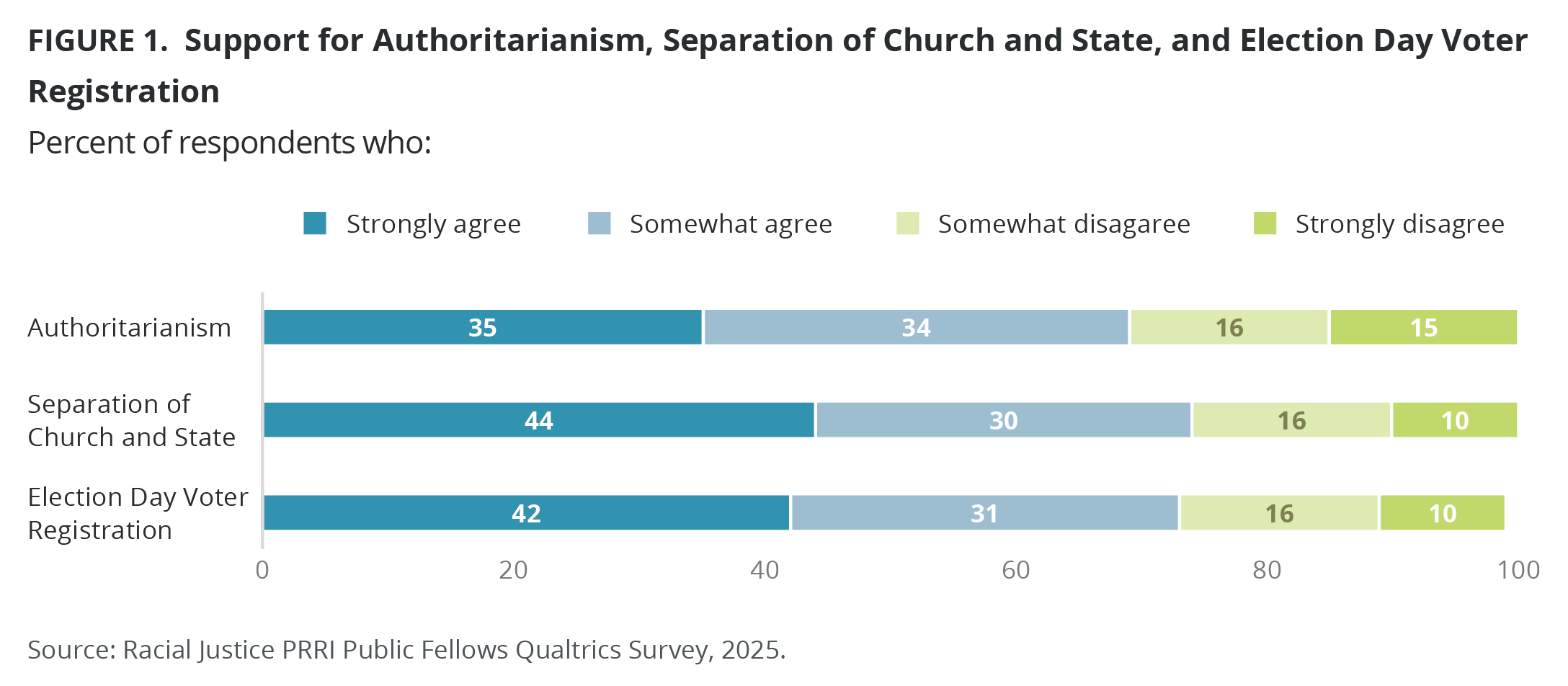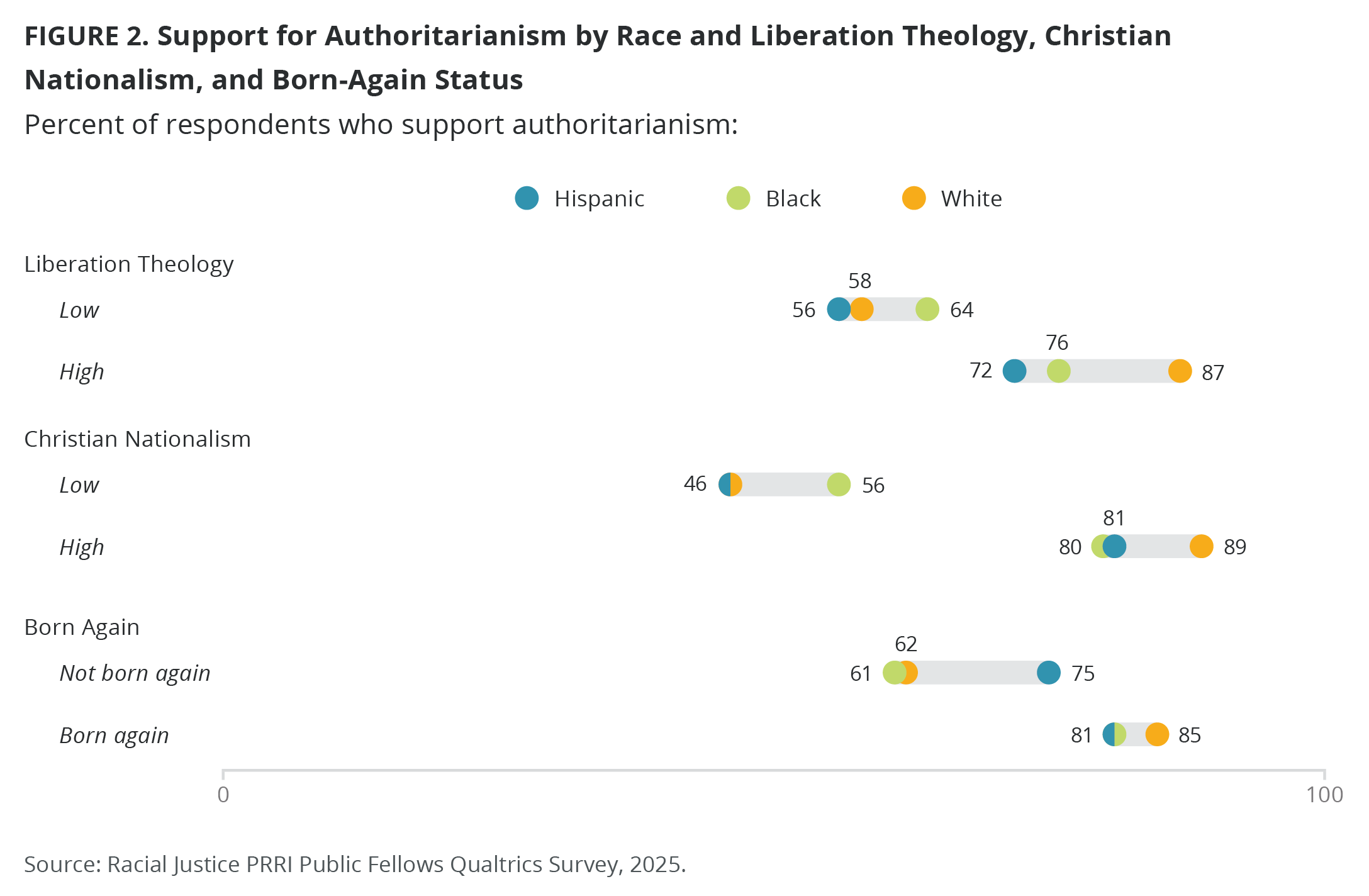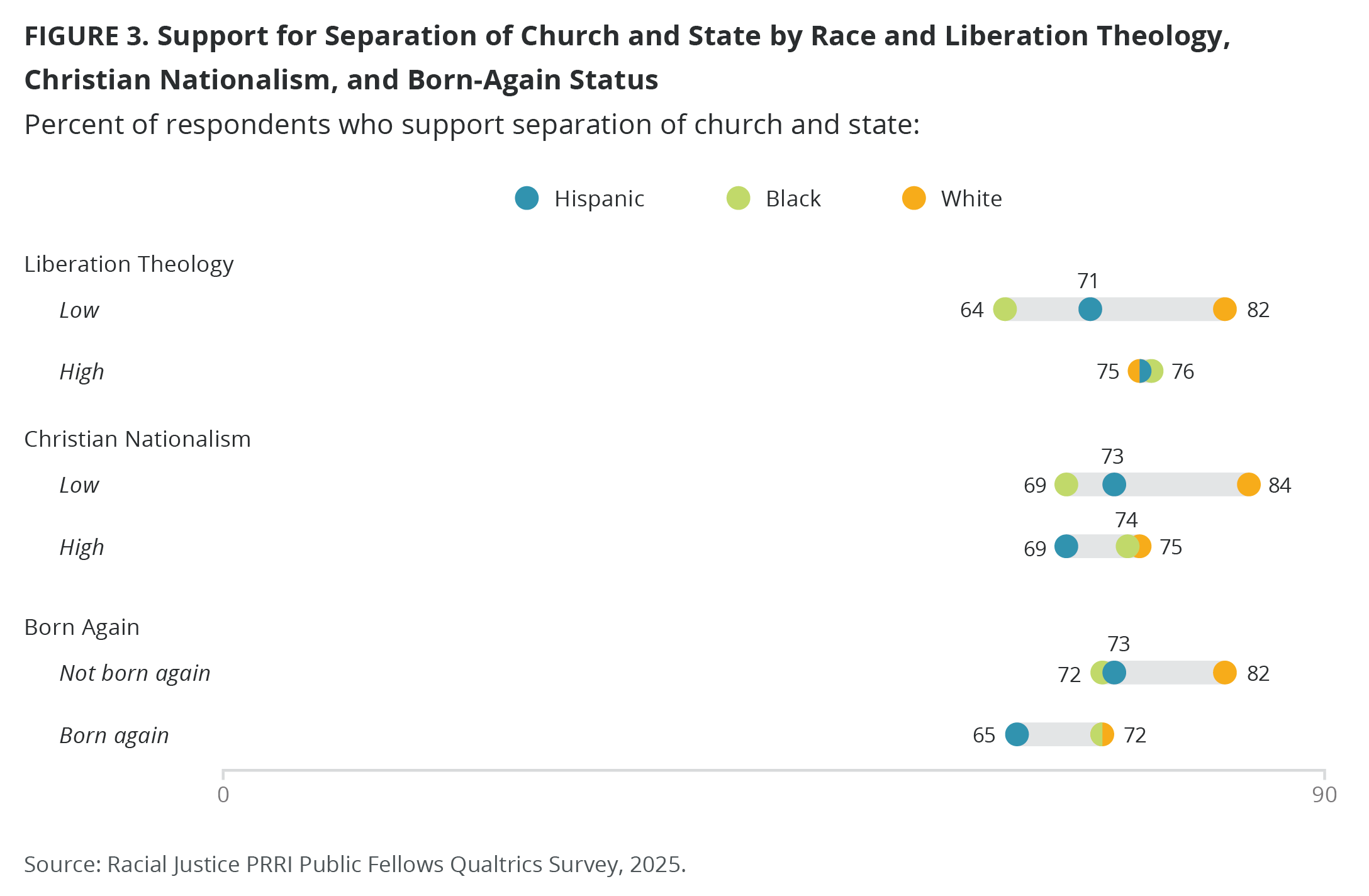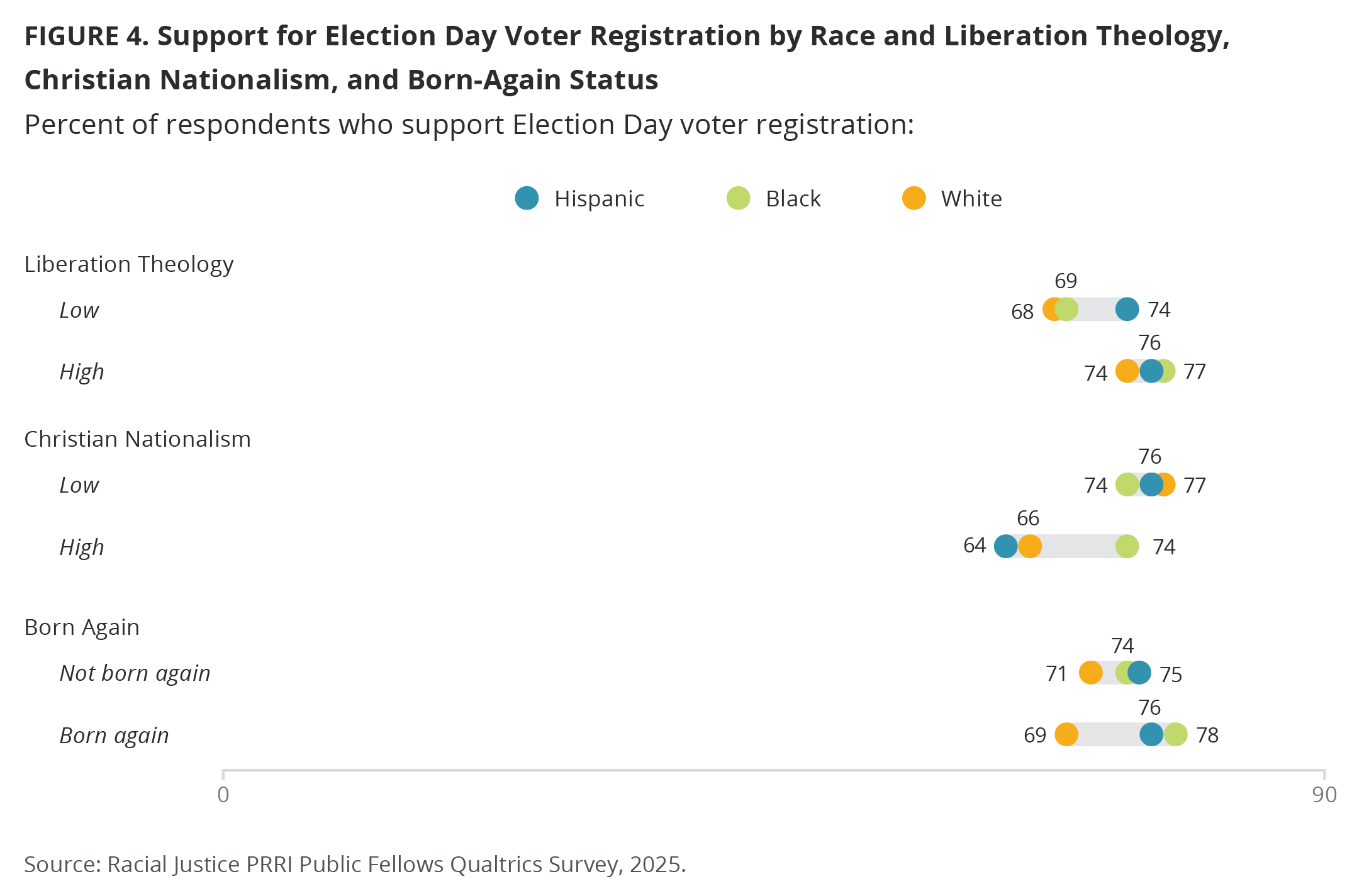Drs. Michael R. Fisher Jr., Ansley Quiros, and Allyson Shortle were 2024-2025 PRRI Public Fellows studying the intersection of politics, religion, and racial justice and white supremacy. This Spotlight Analysis details the findings of their original, collaborative research conducted with support from PRRI.
An April 2025 NPR article reports that a survey of more than 500 political scientists reveals a consensus that the U.S. is drifting from a liberal democracy toward authoritarianism. On a scale of 0 (complete dictatorship) to 100 (perfect democracy), scholars rated American democracy at 67 shortly after the 2024 presidential election. However, that score dropped to 55 just several weeks into President Donald Trump’s term. Without question, the tactics of the second Trump administration have led commentators to declare that the U.S. is “descending into authoritarianism.” What perhaps is more startling is how some parts of the country are embracing authoritarianism. This Spotlight Analysis examines support for democracy among American voters by evaluating their support for authoritarianism and commitment to democratic principles, namely the separation of church and state, and Election Day voter registration. The findings reveal a complicated story about the state of American democracy during the second Trump administration.
PRRI’s 2024 report on the connection between religion and authoritarianism finds that while 57% of Americans do not hold highly authoritarian views, support for authoritarianism is more prevalent among Republicans (67% and 54% on the Right-Wing Authoritarianism [RWA] and Child-Rearing Authoritarianism [CRA] scales, respectively), white evangelical Protestants (64% and 54%), and weekly churchgoers (55% and 51%). Moreover, there is strong overlap among Americans who hold Christian nationalist and authoritarian views. Strong majorities of those who qualify as Christian nationalism Adherents and Sympathizers score high on both the RWA and CRA scales (74% and 61% respectively).
To better understand attitudes on religion, authoritarianism, and democracy across race, we conducted a national survey of over 2,750 respondents with support from PRRI. Fielded in June 2025, the survey was a quota-based sample with roughly equal proportions of Black, Hispanic, and white respondents.

Support for Authoritarianism
Our survey finds favorable support for one manifestation of authoritarianism. Most respondents (69%) agree with the statement “What our country needs is a strong, determined leader who will crush evil and take us back to our true path.” This includes 58% of Democrats, 62% of independents, and 85% of Republicans. While the language concerning “crushing evil” and “our true path” may strike some as odd when describing a democratic leader, adherence to certain religious beliefs may explain the widespread support for this aspect of authoritarianism.
Our data show that adherence to certain political or religious beliefs and ideologies correlates with higher levels of authoritarianism. The largest effects are among white respondents and are widely driven by support for Christian nationalism.[1] Among white respondents, 46% of those scoring low in Christian nationalist beliefs express support for authoritarianism, compared with 89% of those who score high in Christian nationalism. These differences amount to 46% vs. 81% for Hispanic respondents, and 56% vs. 80% for Black respondents. Similar patterns emerge when examining other theological perspectives, such as adherence to liberation theology — religious ideologies that tend to emphasize racial group concerns — or identification as born-again.[2]
An alarming majority of respondents (69%) seem open to embracing at least one aspect of authoritarianism, as evidenced by support for a dictatorial leader. However, this does not necessarily translate to an overarching embrace of all forms of authoritarianism. Most respondents across all racial and religious groups continue to support the separation of church and state and favor same-day voter registration.

Support for the Separation of Church and State
Three in four respondents (74%) agree with the statement “The U.S. must maintain a strict separation between church and state.” Across religious and racial groups, support remains strong regardless of respondents’ levels of adherence to different religious beliefs. The lowest level of support for church and state separation — though still a strong majority — is among Black respondents who score low in liberation theology (64%).[3] They are closely followed by 65% of Hispanic born-again respondents. This suggests that most Americans staunchly and reliably support this First Amendment provision.
Racial and religious factors explain most of the differences observed in respondents’ attitudes regarding the separation of church and state. The biggest divide is seen between white and Black respondents. Most white respondents who score high in Christian nationalism or liberation theology, or identify as born-again, express significantly lower levels of support for church and state separation (75%, 75%, and 72%, respectively), compared with their counterparts (84%, 82%, and 82%, respectively).
Conversely, adherence to Christian nationalism or liberation theology among Black respondents is positively correlated with support for church and state separation. Most Black respondents who score high in Christian nationalism or liberation theology express higher levels of support for the separation of church and state (74% and 76%) than those who score lower on these religious belief systems (69% and 64%).
Meanwhile, among Hispanic respondents, those who score high in liberation theology are more likely to support the separation of church and state (75%) than those scoring low (71%). However, support is lower among those scoring high in Christian nationalism (69%) or who identify as born-again (65%), compared with those scoring low in Christian nationalism (73%) or who do not identify as born-again (73%).
These findings suggest that religious beliefs shape attitudes toward the separation of church and state differently for Black, Hispanic, and white Americans.

Support for Election Day Voter Registration
A strong majority of all respondents (73%) favor allowing Election Day voter registration (same-day registration) for all U.S. citizens. Once again, religious and racial differences explain small variations observed in support levels. For example, adherence to liberation theology is positively and significantly correlated with support for same-day registration among white and Black respondents.
White and Hispanic respondents who score low in Christian nationalism are significantly more likely to support same-day voter registration (77% and 76%, respectively) than those who score high in Christian nationalism in either group (66% and 64%, respectively).
Meanwhile, Black respondents who score high in Christian nationalism are equally as likely to support Election Day voter registration as those who score low (74%). Finally, born-again status fails to explain Election Day voter registration support for any racial group.

Altogether, these findings suggest that both race and the nuances of religion must be considered to understand the totality of religion’s influence on attitudes about American democracy. Our data indicate that Americans demonstrate robust democratic commitments, yet their understanding of how democracy functions is uneven. Most Americans across religion and race value democracy but are willing to embrace at least one form of authoritarianism to arrive at desirable social ends.
Additional research on the mediating role of religion and race on democratic values among Americans during the second administration of our country’s 47th president is warranted.
– “The Border Informs My Faith”: Oral History Methodologies and Understanding Immigration Politics Among People of Faith in Arizona
– Americans’ Responses to Abortion’s Uncertain Legal Landscape
– Faith, Freedom, and the Future of LGBTQ Rights in America
– Why Are All the Black Christians Choosing to Go to Church Together?
[1] Christian nationalism adherence was derived using PRRI’s metric, which asks respondents agreement with a battery of statements (1=strongly disagree; 4= strongly agree): “The government should declare America a Christian nation;” “The U.S. should be based on Christian values;” “If the U.S. moves away from Christian foundations, we will not have a country anymore;” “Being Christian is an important part of being truly American;” and “God has called Christians to exercise dominion over all areas of American society.” All analyses use the PRRI indexed metric of all responses, where a low score equates to somewhat/strong disagreement with the battery and a high score equates to somewhat/strong agreement.
[2] Liberation theology, developed by theologians including James Cone and Gustavo Gutierrez, is based in a praxis of care and emphasizes that Christianity is a religion of liberation and that God is on the side of the poor and oppressed. Born-again status, most common among evangelicals, emphasizes a personal conversion experience with Jesus. To identify born-again status, our survey asked, “Would you call yourself a born-again Christian, that is, have you personally had a conversion experience related to Jesus Christ?” To test for adherence to liberation theology, our survey asked respondents to evaluate several statements that compared Jesus’s experience as described in the Bible to those of different racial groups in the U.S. For more on liberation theology and born-again Christianity, see: James H. Cone, A Black Theology of Liberation (Orbis Books, 1970); Gustavo Gutierrez, A Theology of Liberation: History, Politics, and Salvation (Orbis Books, 1973); and Alan Peshkin, God’s Choice: The Total World of a Fundamentalist Christian School (University of Chicago Press, 1986).
[3] Liberation theology adherence was captured using metrics developed by McDaniel, Dwidar, and Calderon (2018), which provide several batteries for capturing a diverse array of Black religious ideologies. While the metrics were developed specifically for Black liberation theology, we altered the wording for white and Hispanic respondents to capture belief adherence across race. The exact wording we used was borrowed from McDaniel et al. (2018), “We’d like to know if you think each statement is a good or bad way to describe your beliefs, on a scale from 1, where 1 = extremely bad, to 7, where 7 = extremely good. 1. ‘Like Jesus, [Black/Latinos/Hispanic/my people’s] leaders have been punished for speaking the truth;’ 2. ‘Christ’s experience in the Bible is similar to the [Black/Latino/Hispanic/my people’s] experience in America;’ 3. ‘[Black/Latino/my people] hold a special place in God’s plan.’” Low liberation scores equate to a 1-4 on a 7-point liberation theology scale, whereas high liberation scores equate to an average score above the neutral point of 4.







